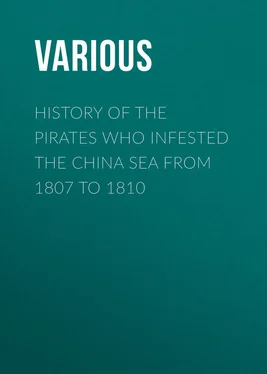Various - History of the Pirates Who Infested the China Sea From 1807 to 1810
Здесь есть возможность читать онлайн «Various - History of the Pirates Who Infested the China Sea From 1807 to 1810» — ознакомительный отрывок электронной книги совершенно бесплатно, а после прочтения отрывка купить полную версию. В некоторых случаях можно слушать аудио, скачать через торрент в формате fb2 и присутствует краткое содержание. Жанр: Медицина, История, foreign_edu, на английском языке. Описание произведения, (предисловие) а так же отзывы посетителей доступны на портале библиотеки ЛибКат.
- Название:History of the Pirates Who Infested the China Sea From 1807 to 1810
- Автор:
- Жанр:
- Год:неизвестен
- ISBN:нет данных
- Рейтинг книги:4 / 5. Голосов: 1
-
Избранное:Добавить в избранное
- Отзывы:
-
Ваша оценка:
- 80
- 1
- 2
- 3
- 4
- 5
History of the Pirates Who Infested the China Sea From 1807 to 1810: краткое содержание, описание и аннотация
Предлагаем к чтению аннотацию, описание, краткое содержание или предисловие (зависит от того, что написал сам автор книги «History of the Pirates Who Infested the China Sea From 1807 to 1810»). Если вы не нашли необходимую информацию о книге — напишите в комментариях, мы постараемся отыскать её.
History of the Pirates Who Infested the China Sea From 1807 to 1810 — читать онлайн ознакомительный отрывок
Ниже представлен текст книги, разбитый по страницам. Система сохранения места последней прочитанной страницы, позволяет с удобством читать онлайн бесплатно книгу «History of the Pirates Who Infested the China Sea From 1807 to 1810», без необходимости каждый раз заново искать на чём Вы остановились. Поставьте закладку, и сможете в любой момент перейти на страницу, на которой закончили чтение.
Интервал:
Закладка:
"This religion is professed by various sorts of barbarians who live southerly beyond Chen ching (Tséamba, or Zeampa), to the Se yu . Their doctrines originated in the kingdom of Me tih no (Medina). They say that heaven is the origin of all things; they do not use any images. Their country is close to Tëen choo (India); their customs are quite different from those of the Buddhists; they kill living creatures, but they do not eat indiscriminately all that is killed; they eat not hog's flesh, and this is the essence of the doctrine of Hwy hwy. They have now a foreign pagoda ( fan tă ), near the temple of the compassionate saint (in Canton), which exists since the time of the Tang. It is of a spiral form, and 163 cubits high. 8 8 The cubit at Canton is 14 inches 625 dec. Morrison, under the word Weights , in his Dictionary, English and Chinese.
They go every day therein to say prayers."
By the kindness of Dr. Morrison, the translator had the pleasure to converse with a member of the Mahometan clergy at Canton. He stated, that in the Mosque at Canton is a tablet, whereon it is written, that the religion of the Prophet of Mecca was brought to China, Tang ching yuen san nëen , that is, in the third year of the period called Ching yuen , under the Tang dynasty, i. e. 787 of our era. 9 9 We see by this statement that Couplet is wrong in saying ( Confucius Sinarum philosophus. Proemialis declaratio, p. 60): "Mahometani, qui una cum suis erroribus ante annos fere septingentos (Couplet wrote 1683) magno numero et licentia ingressi in Chinam."
The compilers of the Memoirs , &c. have taken their extract from the historical work of Ho (4051, M.); they seem not to have any knowledge of Matuanlin, where the Arabs are spoken of under the name of Ta she . See the notes to my translation of the Chronicle of Vahram, p. 76. During the time the translator was at Canton, there arrived a pilgrim from Pekin on his way to Mecca.
"The Fa lan se are also called Fo lang se , and now Fo lang ke . In the beginning they adopted the religion of Buddha, but afterwards they received the religion of the Lord of Heaven . They are assembled together and stay in Leu song (Spain?); they strive now very hard with the Hung maou or red-haired people (the Dutch ), and the Ying keih le ( English ); but the Fa lan se have rather the worst of it. These foreigners, or barbarians ( e jin ) wear white caps and black woollen hats; they salute one another by taking off the hat. Regarding their garments and eating and drinking, they have the same customs as the people of Great Leu song and Small Leu song ( Spain and Manilla )."
This extract is taken from the Hwang tsing chĭh kung too , or the Register of the Tribute as recorded under the present dynasty ( Memoirs , l. c. p. 10 v., p. 11 r.). I am not sure if Ke tsew (10,869) keu (6,063) Leu song , can really be translated by the words — they are assembled together and stay in Leu song . The use of tsew in the place of tseu (10,826) is confirmed by the authorities in Kang he; but does Leu song really mean Spain? The Philippinas are called Leu song (Luzon), from the island whereon Manilla is, and in opposition to Spain ( Ta Leu song, the great L. s. ), Seao Leu song , the small Leu song . It may be doubted whether Leu song without Ta , great , can be taken for Spain. The Chinese have moreover learned from Matthæus Ricci the proper name of Spain, and write it She pan ya . The Dutch, the English, and the Germans, are, from a reddish colour of their hair, called Hung maou . This peculiar colour of the hair found among people of German origin, is often spoken of by the ancient Roman authors; as for instance in Tacitus, Germania, c. 4. Juvenal says, Sat. XIII. v. 164,
Cærula quis stupuit Germani lumina? flavam
Cæsariem , et madido torquentem cornua cirro?
It would carry us too far at present to translate the statements of the Chinese concerning the Portuguese and Dutch. Under the head of Se yang , or Portugal, may be read an extract of the account of Europe (Gow lo pa) the Chinese received by Paulus Matthæus Ricci ( Le ma paou ). The Chinese know that the European Universities are divided into four faculties; and his Excellency Yuen is aware of the great similarity between the ceremonies of the Buddhists and those of the Roman Catholic church (l. c. 17 v). The present Translator of the "History of the Pirates" intends to translate the whole of the 57th book of the often-quoted Memoirs, and to subjoin copious extracts of other works,[Pg xxviii] particularly from the Hae kwŏ hëen këen lăh , or "Memoirs concerning the Empires surrounded by the Ocean." This very interesting small work is divided into two books; one containing the text, and the other the maps. The text consists of eight chapters, including a description of the sea-coast of China, with a map, constructed on a large scale, of the nations to the east, the south-east, and the south; then follows a topography of Portugal and Europe generally. Concerning England we find: —
"The kingdom of the Ying keih le is a dependent or tributary state 10 10 This statement is so extraordinary, that the Translator thought it necessary to compare many passages where the character shăh (8384 M.) occurs. Shăh originally means, according to the Shwŏ wăn , near, joining ; and Shăh kwŏ , are, according to Dr. Morrison, "small states attached to and dependent on a larger one: tributary states." The character shăh is often used in the same signification in the 57th book of our work. The description of the Peninsula of Malacca begins (Mem. b. 57, p. 15 r.) with the following words: " Mwan lă kea (Malacca) is in the southern sea, and was originally a tributary state (shăh kwŏ) of Sëen lo , or Siam; but the officer who there had the command revolted and founded a distinct kingdom." In the war which the Siamese some years back carried on against the Sultan of Guedah, they always affirmed that the King of Siam is, by his own right, the legitimate sovereign of the whole peninsula of Malacca, and that the Sultan must only be considered as a rebel against his liege. The statement of the Chinese author, therefore, corroborates the assertions of the Siamese.
to Ho lan (Holland). Their garments and manners in eating and drinking are the same. This kingdom is rather rich. The males use much cloth and like to drink wine. The females, before marriage, bind the waist, being desirous to look slender; their hair hangs in curls over the neck; they use a short garment and petticoats, but dress in a larger cloth when they go out. They take snuff out of boxes made from gold and threads."
This extract is taken from the " Register of the Tribute as recorded under the present dynasty ."
" Ying keih le is a kingdom composed of three islands: it is in the middle of four kingdoms, called Lin yin : 11 11 On the General Map of the Western Sea ( Se hae tsung too ) Lin yin takes the place of Sweden. I cannot conceive what can be the cause of that denomination. Lin yin , perhaps, may mean the island Rugen ?
Hwang ke , the yellow flag (Denmark), Ho lan , and Fo lang se . The Great Western Ocean (Europe) worships the Lord of Heaven; and there are, firstly, She pan ya (Spain), Poo keăh ya (Portugal), the yellow flag , &c.; but there are too many kingdoms to nominate them one by one. Ying keih le is a kingdom which produces silver, woollen cloths, 12 12 The common word for cloth, to lo ne , seems to be of Indian origin; it is certainly not Chinese. The proper Chinese name is jung .
camlets, peih ke , or English cloth, called long ells, 13 13 Peih ke is written with various characters. See Morrison's Dictionary, under the word Peih, 8509.
glass, and other things of this kind."
Интервал:
Закладка:
Похожие книги на «History of the Pirates Who Infested the China Sea From 1807 to 1810»
Представляем Вашему вниманию похожие книги на «History of the Pirates Who Infested the China Sea From 1807 to 1810» списком для выбора. Мы отобрали схожую по названию и смыслу литературу в надежде предоставить читателям больше вариантов отыскать новые, интересные, ещё непрочитанные произведения.
Обсуждение, отзывы о книге «History of the Pirates Who Infested the China Sea From 1807 to 1810» и просто собственные мнения читателей. Оставьте ваши комментарии, напишите, что Вы думаете о произведении, его смысле или главных героях. Укажите что конкретно понравилось, а что нет, и почему Вы так считаете.












